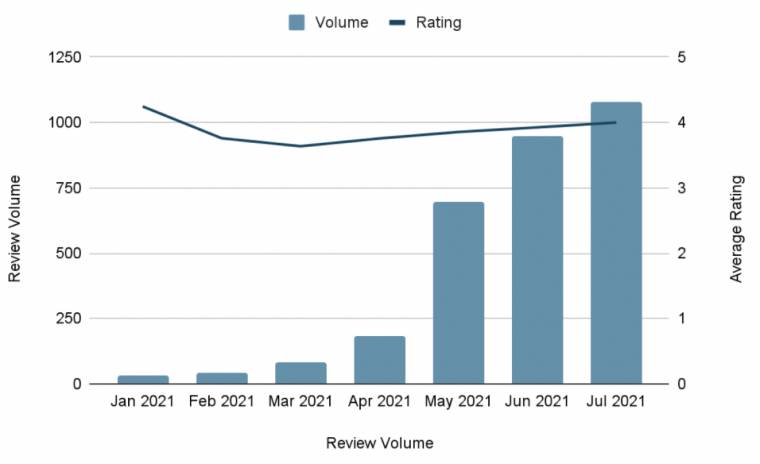How the Chip Crisis Affects Car Dealerships’ Reputations
Reputation Staff Writer

The global computer chip shortage has resulted in inventory shortages on car lots, higher prices, declining sales, and a more challenging experience for shoppers. And the shortage might persist well into 2022. So, how has the global chip shortage affected consumers’ opinions of automotive dealerships?
We decided to find out. For our 2021 Automotive Reputation Report, we analyzed thousands of dealership reviews in North America and beyond to discern the main drivers of buyer sentiment. We found that car dealers need to do a better job managing customers’ expectations with the supply chain-fueled inventory shortage.
Customer Sentiment in the Auto Industry
First off, here’s the good news — a great dealership experience matters very much to consumers. Amid the rise of digital retailing, consumers will go out of their way to visit a brick-and-mortar dealership that they like.
64% of consumers we surveyed said that they would travel more than 20 miles away to visit a top-rated dealership for shopping and test drives. It’s essential that your dealerships deliver a great shopping experience for customers to compare all your cars. In that regard, the chip shortage is a problem.
It should be no surprise that consumers are talking about the fall-out of the chip shortage. Reviews mentioning shortages increased 32.6x from January to July 2021. Unfortunately, sentiment about shortages is dragging down the auto industry’s reputation. In fact, reviews mentioning shortages are roughly twice as likely to be negative compared to reviews about the industry generally.

Related: When ‘Sludge’ Could Be Helpful For Auto Dealerships
We used natural language processing (NLP) to uncover common themes in consumer reviews that cite shortages. The reviews suggest that their dissatisfaction doesn’t stem from a lack of inventory but rather a perception that dealerships are jacking up prices:
- “Even during the car shortage, the audacity to go 30% over MSRP and try to justify it shows what kind of people own and manage this dealership.”
- “Prices above average and unwillingness to discount due to ‘Vehicle shortage’ while their lot is full of vehicles that have been sitting for months. Taking advantage of COVID to gouge customers is disrespectful . . . “
- “ . . . watch other dealers taking advantage of chip shortage by raising MSRP . . . We are fine paying MSRP for a demanding vehicle but to add on an extra $2,000 is wrong.”
Another shopper detailed their experience: “When I arrived at the lot the [Name of Vehicle] was there. It had the features I like and the MSRP showed the price to be $27k. When I asked the sales rep about the second sticker price of $35K, I was told that it was due to the shortage of inventory. An $8,000 markup, talk about highway robbery.”
The customer’s level of dissatisfaction escalated after the shopper asked to speak to someone senior in the dealership. Then, they felt talked down to when the customer pressed the issue.
It’s not that customers are necessarily upset about a chip shortage, but how dealerships communicate with them about the ramifications of the shortage. That includes the impact on the vehicle’s price and the elimination of rebates or incentives. The bottom line is that dealerships face a reputation problem.
Related: Automotive Dealerships: Your Customers Dig Your Digital Experience
What Dealerships Should Do
Car dealership employees may feel like there is not much they can do about high prices. But our analysis indicates that dealers should be more proactive about managing customers’ expectations:
- If you can beat your competition on price, now is a good time to dial up your advertising and organic content. Consumers are going to be especially conscious of rising prices, which will be reflected in their search behavior. Are your ad and organic copy optimized for searches for “deals on XYZ brand”? Don’t miss out on the opportunity to share price changes, new offers, and more. Make it possible for buyers to receive alerts when prices change.
- Amplify your advertising and organic content to promote your sales and parts departments to help diminish the impact of declining sales . For example, Google permits new car dealerships to manage multiple Google My Business (GMB) listings for the same location. According to Google, dealerships can have separate listings for their service and parts departments in addition to sales. Are you making service/parts to potential customers as visible as you could be?
- Get proactive about communicating what your dealership is doing to give shoppers the best deal possible during the chip shortage. Rely on your website, GMB listings, and social media profiles to discuss the inventory shortage and how your dealership is giving your customers a fair deal. Discuss any options you have available to ease the burden of higher prices, such as service discounts. And clearly state all costs upfront and in detail to avoid surprises. This is critical because the price is the most vital factor for buyers. 82% of consumers we surveyed with YouGov said price is the most important consideration.
- Monitor customer reviews closely. Watch for an uptick in negative reviews because of higher prices. Respond to all reviews with empathy and interest. You don’t need to apologize for prices, but acknowledge that any car, from a General Motors to a Toyota vehicle, is a big investment. State the value a consumer has received shopping at your dealership compared to other dealerships.
The Reputation 2021 Automotive Reputation Report digs deeper into all the factors influencing the reputation of the automotive industry, along with ranking the top dealerships and OEMs.
Keep Reading: The Evolution of the Automotive Customer Journey










